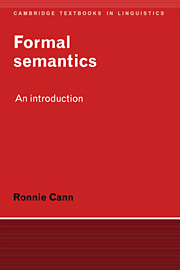Book contents
- Frontmatter
- Contents
- List of figures
- Preface
- List of symbols
- 1 INTRODUCTION
- 2 PREDICATES AND ARGUMENTS
- 3 NEGATION AND CO-ORDINATION
- 4 TYPE THEORY
- 5 THE LAMBDA OPERATOR
- 6 QUANTIFICATION
- 7 INFERENCE
- 8 TIME, TENSE AND ASPECT
- 9 POSSIBLE WORLDS
- 10 INTENSIONAL SEMANTICS
- Answers to selected exercises
- References
- Index
Preface
Published online by Cambridge University Press: 05 June 2012
- Frontmatter
- Contents
- List of figures
- Preface
- List of symbols
- 1 INTRODUCTION
- 2 PREDICATES AND ARGUMENTS
- 3 NEGATION AND CO-ORDINATION
- 4 TYPE THEORY
- 5 THE LAMBDA OPERATOR
- 6 QUANTIFICATION
- 7 INFERENCE
- 8 TIME, TENSE AND ASPECT
- 9 POSSIBLE WORLDS
- 10 INTENSIONAL SEMANTICS
- Answers to selected exercises
- References
- Index
Summary
Although billed as an introduction to formal semantics in general, this textbook is concerned primarily with what has come to be called Montague Semantics and is therefore based primarily on Montague (1970a; 1970b; 1973). A good deal of research within Montague's general framework has been carried out since the 1970s and this has led to many changes in, and many variations of, the original theory. Other research has also led to reactions to Montague's programme and the development of rival theories. Only a few of these revisions and extensions to Montague's theory have, however, found their way into the text of the book. This may seem retrogressive, but it is my conviction that many of the questions being asked in formal semantics and the directions of research are best understood by learning about the more radical elements of Montague's original approach, particularly the semantic analysis of noun phrases and the theory of intensionality. Once these have been grasped, later developments can be understood more easily. For this reason, the exposition develops an account of the now classical version of Montague's theory, but references are given for the major revisions and extensions at the end of each chapter for readers to pursue as their interests dictate. Furthermore, there is no attempt in this book to give more of the logical and mathematical background than is necessary to understand how such things can help in the analysis of the semantics of natural languages.
- Type
- Chapter
- Information
- Formal SemanticsAn Introduction, pp. xiii - xivPublisher: Cambridge University PressPrint publication year: 1993

